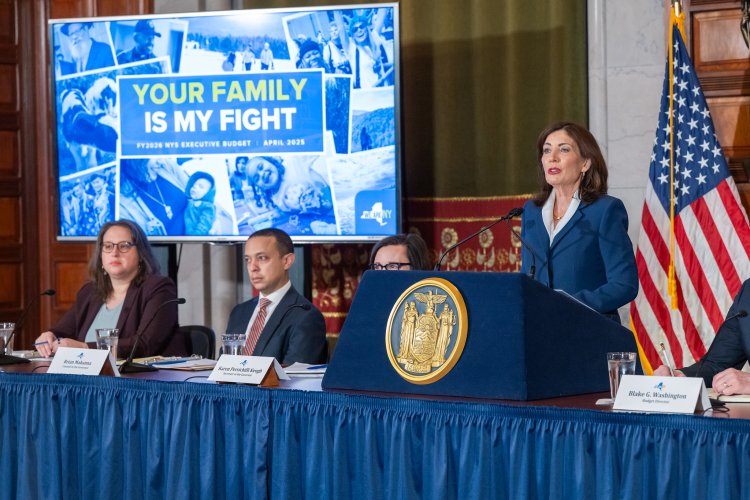Hochul reveals $254 billion state budget; cautions about potential federal reductions
The Democratic governor successfully convinced legislators to reduce the criteria for the involuntary commitment of individuals with mental illness.

This annual spending plan will not take effect until lawmakers resolve various spending issues and contains policy agreements that the Democratic governor negotiated with legislative leaders, who were at times hesitant on contentious public safety matters, leading to negotiations extending nearly a month past the budget deadline.
The budget aims to enhance the state’s discovery law to combat recidivism, adjust the criteria for involuntarily committing mentally ill individuals to hospitals, prohibit cell phone usage in schools, and impose restrictions on face coverings — all initiatives that Hochul has advocated.
However, despite these accomplishments, Hochul’s pre-election-year objectives faced significant dilution due to opposition from left-leaning lawmakers.
“Despite the chaos and uncertainty that's just constantly evident in Washington, we still delivered for the people of New York; we still got it done,” Hochul remarked during a press event at the state Capitol on Monday night. “We refused to be drawn into the toxic, divisive politics of the moment.”
Traditionally, Hochul did not appear alongside Assembly Speaker Carl Heastie and Senate Majority Leader Andrea Stewart-Cousins, who did not provide immediate statements regarding the budget agreement.
The proposed budget, which is set to be the largest in state history, is $100 billion larger than the budget from a decade ago. The increase is attributed to soaring prison costs along with additional spending on health care, child care, and education, resulting in a total that is $2 billion above Hochul's original proposal made in January.
Though lawmakers anticipated a relatively quiet negotiation process for this year’s fiscal plan, Hochul’s insistence on addressing challenging topics, such as the intersection of mental health and crime as well as the use of face masks, shifted the dynamics of her fourth budget since taking office. Many of her issues were raised late in the negotiation process.
Lawmakers moderated Hochul’s proposed ban on public mask-wearing, which she introduced last summer amid widespread protests related to the Israel-Hamas war, agreeing to reduce the penalty for violations to a misdemeanor when associated with other charges.
The budget will enable hospitals to involuntarily commit mentally ill New Yorkers if they are unable to meet basic needs, relaxing the previous standard that permitted involuntary commitment only when a patient posed a threat to themselves or others.
To address a significant increase in dismissals of criminal cases attributed to stringent evidence-sharing requirements from prior reforms, the governor modified the state’s discovery law. Changes made in 2019 intended to prevent the accused from remaining in jail prior to their trial.
The Legal Aid Society expressed concerns regarding the amendments to the discovery law included in Hochul's budget.
“Regardless of these amendments, we will continue to vigorously litigate our clients’ cases to hold prosecutors accountable when they fail to meet their discovery obligations,” the statement said. “The people we serve are entitled to see the full weight of the evidence pending against them, in a timely manner — a basic principle of fairness and due process, and the bare minimum necessary to ensure a zealous defense.”
The statement criticized what it described as “a closed-door, backroom approach to policy-making in the budget process” while recognizing legislative leaders for “fight back against the worst of the Governor’s proposals.”
Michael McMahon, the Staten Island district attorney and president of the District Attorneys Association of the State of New York, expressed gratitude for Hochul’s commitment to the association and to the people of New York.
"The rights of victims will no longer be tossed with thousands of cases because of the technical limitations of the previous law; while the constitutional protections of those accused of crimes will continue to be protected," he remarked. "Our communities will be safer and our criminal justice system will be fairer and more efficient."
The budget includes a significant provision to prohibit students from bringing cell phones into classrooms statewide. This policy follows Hochul’s successful initiative last year to limit the influence of social media algorithms on children to safeguard their mental health.
During the budget discussions, Hochul focused on drafting a plan that did not proactively address potential federal cuts. On Monday, she acknowledged that lawmakers might reconvene for a special session to address the impending threat posed by the Trump administration's fiscal policies.
The Citizens Budget Commission, which advocates for fiscal prudence, issued a statement criticizing Hochul for failing to prepare for possible federal cuts.
"The month-late State general budget agreement fails to address the imminent threat facing New York: looming federal budget cuts,” said CBC president Andrew Rein. “Instead of shoring up the State’s fiscal foundation, lawmakers are dramatically increasing spending the State cannot afford in the long run."
Hochul appeared to recognize this reality, stating that “there's a possibility that we'll have to come back later this year and update our budget in response to federal actions."
"At the end of the day, Congress Republicans, including seven from our state, they have the power to stop these reckless federal cuts,” she added.
Additionally, the governor aimed to respond to voter concerns about New York’s high cost of living by allocating $2 billion for rebate checks for residents and expanding a child tax credit.
However, much of the budget is still unresolved.
While Hochul announced a budget agreement on Monday evening, state lawmakers still need to finalize key spending decisions, including funding formulas for public schools and Medicaid. They plan to meet this week to discuss these essential financial matters before resuming negotiations on remaining legislation ahead of the conclusion of their annual session in June.
Debra A Smith for TROIB News












